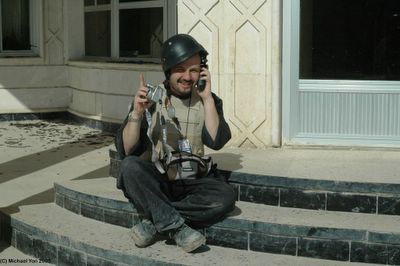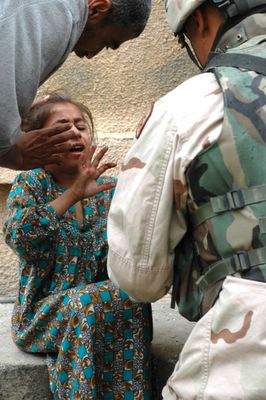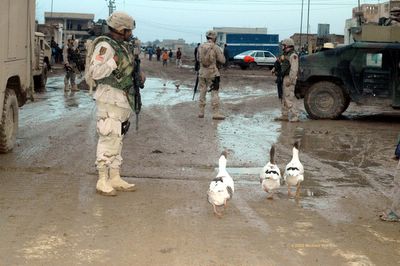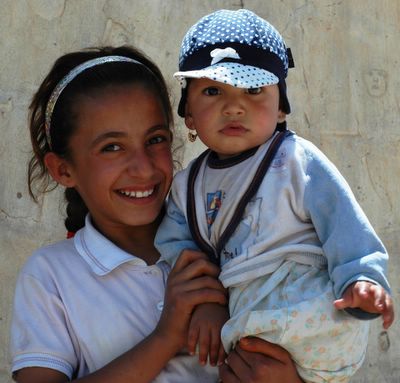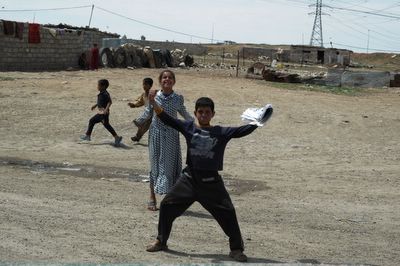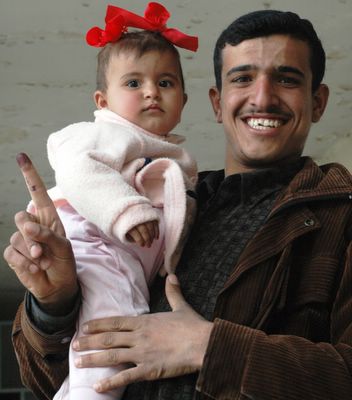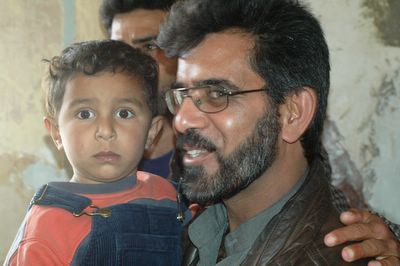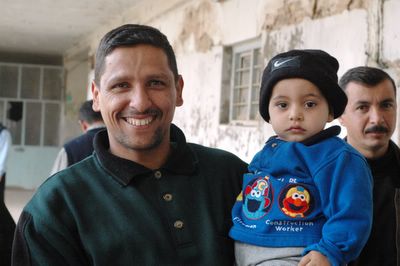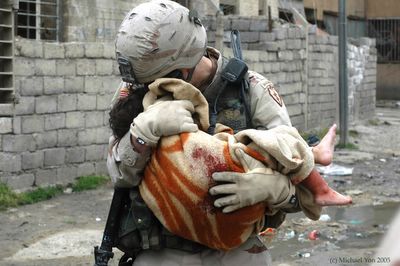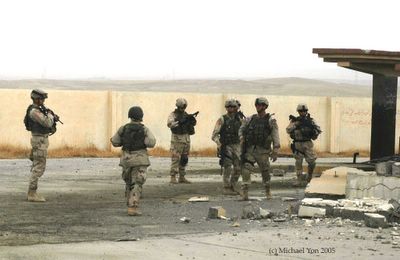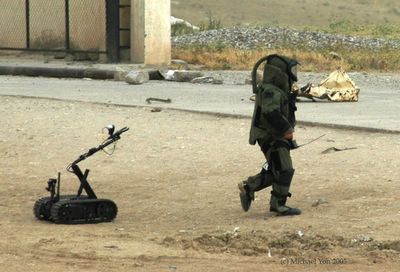
The Deuce-Four Fighting for Mosul
Mosul, Northern IraqAs the new map of Iraq unfolds, a picture of progress emerges. The Iraqis who want freedom and democracy are gaining ground. From what I hear about the news back home, this might sound unreal. Nightly tallies of roadside IEDs and suicide car bombers driving headlong into crowds, like the Vietnam body counts on the Huntley-Brinkley Report, are the main summary of events, while most of this country is peaceful.
There are seventeen provinces in Iraq, and more than ten are quiet. They are busy rebuilding the infrastructure; building a new democracy, but mostly just getting on with life.
Unfortunately, the "Sunni triangle" is a region churning with an insurgency that shows no sign of letup. But by focusing on the flames, the media does not give the world a fair or accurate representation of what's happening for most Iraqi people, or for most of the Coalition forces. I, too, have spent most of my time in Iraq in these dangerous provinces, so even these dispatches might indicate that Iraq has more problems than is actually the case.
Yet even here in the warring provinces, progress is clear. I have endured many tedious meetings with agendas focused on roadside trash, local business development, or Iraqi police training. These normalities do not make good news.
Though "the media" zooms in on the flames, viewers are equally complicit. After all, who among us is more likely to tune in or read about another successful Iraqi adopt-a-highway initiative, when the other option is dramatic footage of the fighting that our people face every day inside these jagged borders?
And so it is. I am with the 1-24th Infantry Regiment of the 25th Infantry Division, whose soldiers are fighting some of the most serious insurgency battles in Iraq.
To understand the situation in Mosul today, it helps to recap events beginning last March. Just one year ago, Mosul was largely peaceful. It hardly made the news. Then, far away in Falluja, insurgents ambushed and murdered four American contractors. In a scene as savage as any captured on film, a crowd morphed into a frenzied mob, dancing and mugging for the cameras as they beat smoldering corpses. With a depravity that even in retrospect retains its power to stun any person with a soul, they stampeded through the streets, dragging the dead behind them, until finally hanging what was left of the bodies from a bridge; pausing only to pose for souvenir photos.
The Coalition responded by clearing out the entire city, killing more than one thousand enemy fighters, and dispersing thousands of others "like roaches" throughout Iraq. Displaced fighters streamed from their nests in Falluja, scuttled into hiding throughout Iraq, and began spreading the disease of violence. Many landed in Mosul.
The 25th Infantry Division assumed control of Mosul in mid-October 2004, just when those enemy fighters started arriving from Falluja, soon to be reinforced by fundamentalists streaming in from the border countries. While the Americans happened to be in the middle of reducing troops in Mosul, the enemy happened to be rushing in. This irony didn't escape the enemy, who responded to the changing odds by stepping up the violence against Americans.
According to Captain John Jodway, an intelligence officer of the 1-24th Infantry Regiment, the 1-24th tour began with American units taking hundreds of mortar rounds. When the Coalition responded by targeting mortar cells, the volleys sharply decreased. Out-gunned, the insurgents shifted from large mortar attacks on a well-defended military targets, to hacking off the heads of unarmed civilians.
This crescendo of cruel and capricious violence lasted two months. Iraqis who resisted the murderers were murdered. American soldiers found about 250 corpses in Mosul. The city had become an open-air prison, with the streets largely under the control of ruthless gangs. They attacked police, killing or scattering nearly all of the fledgling force, and looted their stations.
Days rolled on. Showing evidence of training, the terrorists began seizing and trying to hold entire neighborhoods in Mosul. They carefully selected terrain that would be defensible, stationed fighters with rockets and machine guns on rooftops. They lined streets with explosives, apparently believing they could keep out the Americans. The 25th Infantry would roll into the strongholds and kill dozens of fighters at a clip. One linear ambush was more than a mile long. The 1-24th was caught by surprise. But after they managed to fight through to the end of the ambush, the commander, who was in the thick of the fight, ordered his men to turn around and head back into the ambush, then led his men into the kill zone to kill more enemy. The insurgents stopped using this tactic.
On December 21st, with the Iraqi national elections just over a month away, the enemy managed to get a suicide bomber into the dining facility on an American base in Mosul, where the 1-24th and other units live. Twenty-two Coalition members were killed in the attack. Despite the pain of that loss, there was little time to mourn. They call it "soldiering on." The soldiers had a job to do and so they continued to hunt down and kill insurgents in large street battles that occurred nearly every day from mid-October through late December.
New Year's Day, 2005: Iraqi elections were looming. Every day brought the insurgents one step closer to their ultimate enemy: democracy. Every ballot cast would be a shot in the heart of despotism. The enemy showed the depth of their fear of freedom by stepping up intimidation aimed directly at election workers. Wave after wave of brutality washed away the thin veneer of courage that had barely had time to dry a first coat. The election workers quit.
With no election staff, and no police force, the insurgents resorted to attacking firefighters. Their apparent relentlessness made the possibility of Iraqi elections seem remote. After a solid month of increasing attacks, most observers had written off the idea, while cries to postpone voting began to drown out even the guns of the insurgents.
But then January 30—now one of the more remarkable days in recent world history—dawned to a scene of courageous Iraqis—men, women, old and young, whole families, taking tentative but nonetheless determined steps to freedom. The success of the elections in Mosul and throughout Iraq stunned naysayers across the continents. Millions of Iraqis voted, leaving little room for dispute about their intent to embrace democracy. Iraqis risked their lives to vote, simultaneously shaming and inspiring many who watched.
It wasn't over. Ever anxious for effect, but increasingly pressed to scale down their activities, the enemy again shifted tactics. Through most of February, the insurgency was characterized by drive-by shootings and sniper attacks. The Coalition countered in Mosul, and began killing snipers. Those attacks remarkably decreased.
This brings us to now. The latest weapon in vogue in Mosul is the car bomb or, as it is often called in Iraq, VBIED (Vehicle Borne Improvised Explosive Device). When VBIEDs are piloted by suicidal men, they are called SVBIEDs. In Mosul, the enemy tries to ram SVBIEDs into the American Stryker vehicles. There have been more than twenty such attacks in Mosul recently.
The attacks sometimes fail, or are detected just before they happen. The 1-24th saw one car that was weighted down and driving erratically, so they shot the tires. The Saudi driver refused to leave the car but tried to persuade the Americans to come to him. While the Americans used an interpreter with a bullhorn to coax him out, the bomber stayed in the car. The Americans shot the car. It caught fire and exploded.
There are about seven hundred soldiers in the 1-24th, and they have been in some of the fiercest fighting in Iraq. As they complete the first half of their tour, the statistics tell the story--about one man in every six has been wounded or killed.
Lieutenant Colonel Erik Kurilla commands the 1-24th (Deuce-Four). Kurilla's men describe him as a ferocious fighter, afraid of nothing, a man who leads from the front. I would soon witness this with my own eyes.

LTC Erik Kurilla and SFC Robert Bowman in Mosul
At FOB Marez, home of the Deuce-Four, the morale crackles in the air like gunfire. The heavy losses have not dampened the fight in these men. One young soldier told me, "This is my family. Colonel Kurilla is like my dad. He would die for me." These are not the youthful proclamations of inexperienced troops who haven't seen enough combat to know what bullets and bombs mean.
At midnight on my first day at Marez, I go to the gym. The place is packed. At seven the next morning, I go back to the gym. It's packed again, this time with many of the officers and senior NCOs I met the day before. Some are just coming in from missions, others will soon be going out. Without saying a word, every move telegraphs that these are serious soldiers.
On my first mission with the Deuce-Four, I rode with LTC Kurilla in his Stryker vehicle. Several officers and men told me it's the most dangerous vehicle in Mosul because anytime Kurilla's soldiers get into trouble, he comes to help. We rolled off the base and into the streets of Mosul. The mission was simple: the soldiers make rounds to the Iraqi Police and Army, checking on how things are going.
Various elements of the Deuce-Four patrol around Mosul in Strykers, searching for suicide attackers, looking to spot them before they strap themselves into their moving bombs and take aim at a Stryker. The plan is extremely dangerous. The enemy has major advantages in this scenario. Strykers can be positively identified at a glance from a mile away. Traffic can be heavy in Mosul, another sign of the gradual improvement in security. Car bombs can be tough to spot at any range. Every soldier knows the consequences of every call. Shoot the wrong car, kill innocent people. Let the wrong car slip through, everybody in the Stryker might die. In some ways, life is simple here. Simple, not easy. Simple, but mined with danger. Seven days a week, in addition to conducting raids, and a full spectrum of offensive military operations, the Deuce-Four rolls out the gate.
It was afternoon when LTC Kurilla started his rounds in Mosul. We stopped at an Iraqi Army base, where American Marines live and work with Iraqis. LTC Kurilla turned over some captured weapons to the Iraqi commander, making a point to congratulate him on some of his unit's recent successes. Among the weapons is a Russian sniper rifle that had been used to shoot an American Marine Captain in the head. Luckily, the Marine's helmet stopped the bullet. When I met that Marine Captain, still on duty at the same station, he politely recounted the story of getting shot in the head. He was not hurt, although the impact had knocked him cold, but one of his friends was seriously wounded in the same attack.
The Deuce-Four departed the Iraqi garrison and headed to a police station where only a few months back the insurgents owned the real estate. The area around the station is pocked with bullet holes and scarred from explosions. Dozens of policemen armed with AKs stand about, waiting for something to happen, while LTC Kurilla discusses administrative matters with their chief.
As I started shooting video of the police, two deep thuds came from the distance. Deep enough for Air Force Staff Sergeant Will Shockley to remark, "Holy shit." I've heard many car bombs since coming to Iraq. "That sounded like a VBIED," I said, "Or a
big IED." The sounds hadn't fully registered when LTC Kurilla walked out and asked "Where was that at?" Several Americans pointed in the direction where a mushroom cloud was rolling into the sky. We ran for the Strykers a couple hundred yards away.
Americans came onto the radio saying that a car bomb hit a Deuce-Four Stryker. We loaded the four Strykers, closed the ramps, and rolled. The attack site was three minutes away. The radio chattered that American helicopters and jets were inbound to provide cover, but the ground situation was tenuous; the initial blast might be the enemy's first move, but not the main attack. There might be follow-on suicide attacks, or IEDs planted on target, or perhaps dozens of insurgents with machine guns and rockets might be waiting to ambush us.

SVBIED attack on 23 April
When a soldier on the radio announced that the Stryker was burning with men trapped inside, the troops inside our Stryker began un-strapping fire extinguishers. We stopped and the ramp opened. The soldiers burst out running. Fires burned in several locations. Most of the tires were blown off the Stryker, while smoke poured from the hatches. The Stryker was filled with ammunition, but the back ramp had been jammed shut in the initial explosion. Four injured soldiers had gotten out, while two were trapped inside.
LTC Kurilla ran to the burning Stryker, threw off his protective gear and helmet, leading a swarm of soldiers atop and over the burning hulk, in a determined push to get their buddies out. Kurilla dropped himself down a top hatch, to get into the burning Stryker, while men passed up fire extinguishers and even bottles of water. Major Mark Bieger and others were also atop the vehicle, alongside one gutsy Private First Class that everyone calls "Q."

"Get them out!"
The taste of toxic smoke combined with heat of the fires were overwhelming sensations. Rescuers and the men trapped inside were choking to death on that smoke. Attention was split between the urgent rescue at hand and the threat of follow-on attacks. Within minutes of our arrival, the men had wrestled out their severely injured friends and were climbing off the burning Stryker, separating into teams that shored up defensive positions while others scoured the area searching for other IEDs.
The officers worked alongside the men, collecting every large piece of the damaged Stryker; nothing would be left behind for the enemy. Here in the heat of mid-day, with burning debris spread up and down the road, the men carried heavy twisted chunks of metal, tossing them atop the mangled hulk. A recovery vehicle was on the way.
Meanwhile, American sniper teams had found perches around the blast site, and Army attack helicopters circled low overhead, at times so close that I could practically see the patches on the pilots' uniforms, while fast-moving jets roared low to the ground in a show of force. In just minutes, Deuce-Four had extracted their friends while preparing to unleash a devastating response if the enemy came out in force.
As the road cleared, someone made out the blackened hand and foot of the suicide attacker, smoke still curling off them. A lieutenant muted from smoke inhalation grabbed me, motioning for water; but he never stopped picking up debris. The men managing defenses continually assessed battlefield conditions, improving their posture. When the Iraqi translator heatedly ran off with no backup to question some Iraqis, I thought he might be shot down, but he came back to the road angrily cursing the attackers.
Once the recovery vehicle arrived and dragged the smoldering Stryker away, we needed to roll. But the Deuce-Four all know what comes next. The gloating posse descends, camera crews at the ready, to shoot video that gets posted to the web and beamed around the world, of them in full celebratory dance, as if they had scored a major victory against "infidels."
Just a few weeks earlier, when another of Kurilla's Strykers was hit by an SVBIED, a camera crew arrived on scene. As a man pumped an AK, an American sniper killed him, wounding the cameraman in the process. When it was later learned that the cameraman was a stringer for CBS who had close ties with the enemy, CBS apologized on the air.
Just as we pulled out, people arrived with cameras and began shooting footage of the scene. One of the men, whom we later learned was an Associated Press correspondent with known ties to the enemy, is dead now. The associate scavenging with him was seriously wounded.
Deuce-Four drove back to base, heading straight for the hospital, where they waited for word of their friends. Six had been wounded, all were serious. I was certain that the presence of all their buddies in the waiting room was helping those men somehow. On some levels, at least, it was. When a medical person came out to say they were short of A-Negative blood, a soldier was found with the right type in his veins. The battle had shifted to an operating room, but these men were still in the fight together.
After some hours, LTC Kurilla knew there was nothing more his men could do at the hospital--this was going to be a long night. So, as much for the good of his men as for the demands of the clock, he ordered them back to duty. But Kurilla didn't leave. He stayed at the hospital with his wounded men. Sometime that night, Sergeant Anthony Davis, one of the men who had been trapped in the Stryker, died from his injuries. He was 22.
The news brought a fog of sadness to the men that rolled with them on their missions back into Mosul that night. And the next day, when Kurilla was back with his men, they rolled out again, this time talking with shop owners and others who might have information about attacks, past or pending.
A mission or two later, riding along with B Company on a raid, we picked up a couple of prisoners at the first target location. One of the prisoners started spilling information, so they took him along to ID another target house when,
Blam! A Stryker in front of us hit an IED. It was a large explosion, but only one of the eight tires blew out, so we drove on, hitting another house, getting another prisoner, and coming back home to FOB Marez.
Since that day, six days ago, four more Americans and an interpreter have died from suicide strikes in the AO. Yesterday there were multiple large IED attacks here, two SVBIEDs downtown, and the men of Deuce Four keep soldiering on.
[Please join the free email list for updates.]
01May05

